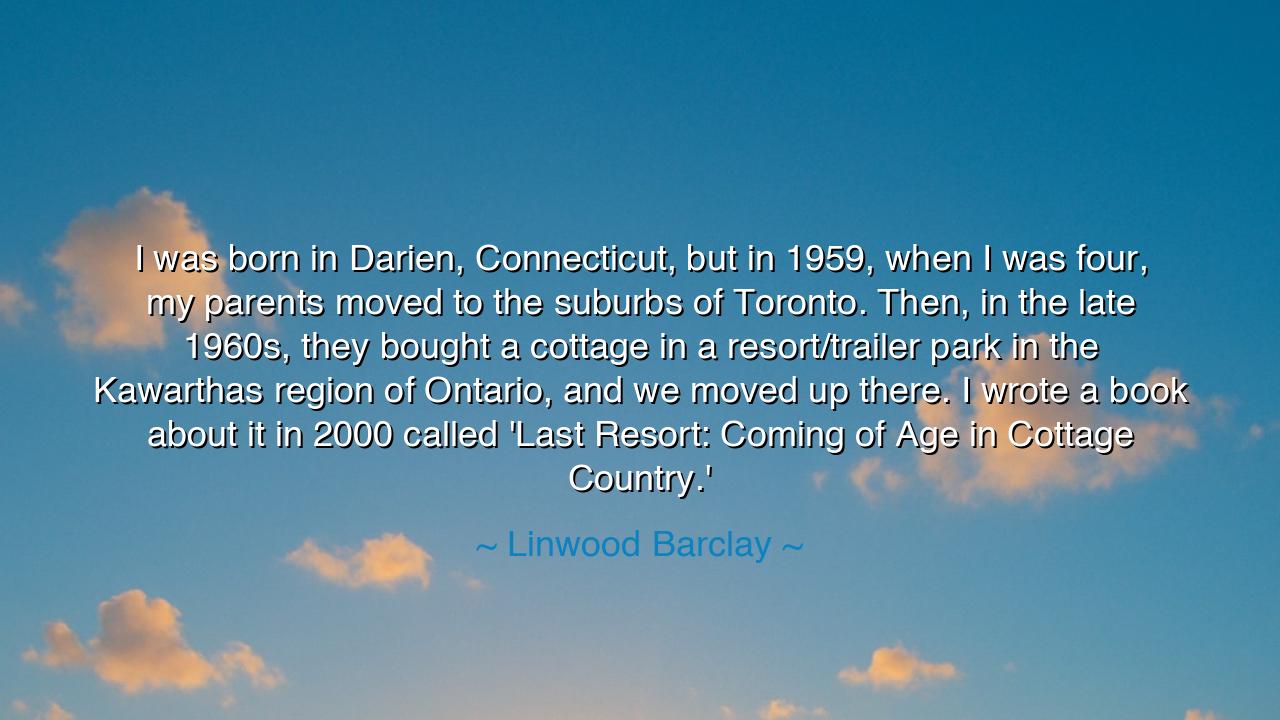
I was born in Darien, Connecticut, but in 1959, when I was four
I was born in Darien, Connecticut, but in 1959, when I was four, my parents moved to the suburbs of Toronto. Then, in the late 1960s, they bought a cottage in a resort/trailer park in the Kawarthas region of Ontario, and we moved up there. I wrote a book about it in 2000 called 'Last Resort: Coming of Age in Cottage Country.'






In the journey of life, we are often shaped not only by where we begin, but by the places we are drawn to, the homes we make, and the experiences that mark our passage through time. Linwood Barclay captures this beautifully in his reflection, recounting his journey: "I was born in Darien, Connecticut, but in 1959, when I was four, my parents moved to the suburbs of Toronto. Then, in the late 1960s, they bought a cottage in a resort/trailer park in the Kawarthas region of Ontario, and we moved up there. I wrote a book about it in 2000 called 'Last Resort: Coming of Age in Cottage Country.'" This story speaks not only to the physical relocation of a family, but to the deeper transformation that occurs when one is pulled into new places—places that become the backdrop for personal growth, identity, and the quest for belonging.
The ancients often spoke of home not just as a physical structure, but as a deeply symbolic space where one’s character and life’s journey take shape. In Homer’s Iliad, for example, the concept of home—whether it was the walls of Troy or the distant shores of Ithaca—was central to the warriors’ struggles, the place from which they drew strength and purpose. Much like the Greeks, who found their identities intertwined with the lands they fought for, Barclay’s journey mirrors the ancient understanding that where we are, how we live, and the places that form us are intricately linked to who we become. Toronto, the suburbs, and eventually the Kawarthas were not just locations—they were the crucibles in which Barclay’s character was forged.
The transition from Darien to Toronto and later to a cottage in Kawarthas reflects a pattern of growth that is universal. The coming-of-age journey is not one defined solely by the place where we are born, but by the places we move to and the worlds we enter. Barclay’s move to a cottage in the Kawarthas symbolizes a pivotal change, one that shaped his perception of the world and himself. Much like the philosophers of old who sought new knowledge in distant lands, Barclay found that his relocation to a new environment brought forth new challenges, new experiences, and ultimately a deeper understanding of his own identity. As the ancients understood, the journey to new lands is often a journey to discover more about who we are.
In the ancient world, the change in geography often meant a change in perspective. Consider Homer’s Odysseus, whose journeys across the seas were as much about internal transformation as they were about physical travel. His trials and adventures were the crucibles in which his character was tested, refined, and ultimately transformed. Similarly, Barclay's move from the suburbs of Toronto to the Kawarthas was a metaphorical journey—a passage from one world to another, from one understanding of self to a new and more nuanced understanding. The place itself, like the mythical Ithaca, became part of the larger narrative of self-discovery.
But Barclay’s story is not merely about moving from place to place—it is about the experiences and memories that define the passage of youth. The cottage in Kawarthas became a site of adventure, a backdrop for stories that shaped not only Barclay’s youth, but the man he would become. Just as the ancients saw childhood as a time of learning, growth, and preparation for the trials of adulthood, Barclay’s experiences in the Kawarthas were rich in lessons that would fuel his journey into maturity. The cottage was more than a retreat from the world; it was a place where the complexities of life were both discovered and confronted.
The lesson that Barclay’s story teaches is this: our identity is not shaped by a single place or moment in time, but by the experiences we gather from the shifting landscapes of our lives. Whether it is the urban landscape of Toronto, the quiet Kawarthas, or the distant shores of another country, it is the encounters with people, nature, and our own inner lives that form the basis of who we are. Just as Homer’s heroes grew through the places they traveled and the battles they faced, we too must learn to embrace the transitions in life, for it is in the new places—both physical and emotional—that we discover the next chapter of our story.
So, too, should we not fear the shifts in our own lives. Like Barclay, we must embrace the unfolding journey, understanding that our experiences—our changing homes, relationships, and environments—are the forces that shape us. The places we live and the stories we write in those places are the essence of our becoming. As we move through life, let us not cling to what is familiar, but open our hearts and minds to the transformation that comes with change. For just as the Kawarthas became a part of Barclay’s legacy, so too do the places we move to and the experiences we gather become the foundation upon which our own stories are built.






AAdministratorAdministrator
Welcome, honored guests. Please leave a comment, we will respond soon